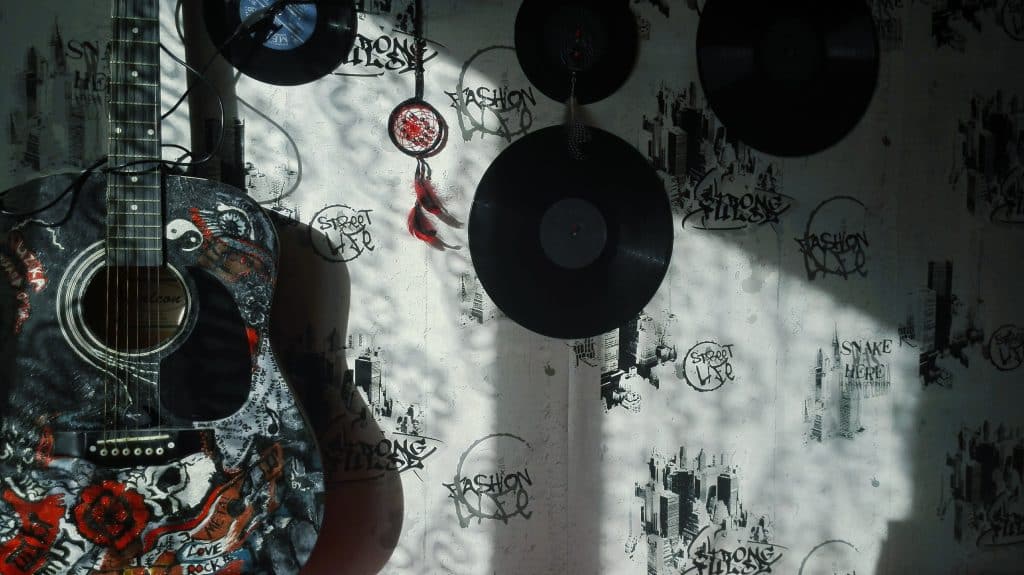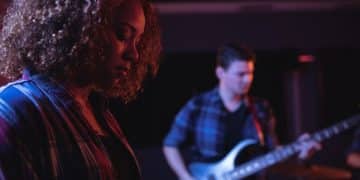Underground punk rock lyrics: Voices of rebellion and resistance

Unraveling the lyrical tapestry of underground punk rock lyrics reveals a potent, unfiltered reflection of socio-political dissent, challenging established norms and empowering marginalized voices.
For decades, underground punk rock lyrics have been more than a musical exercise; they’re an exploration into the heart of counter-cultural dissent and a raw, unflinching mirror reflecting American society.
From visceral cries against consumerism to searing indictments of governmental overreach, underground punk rock lyrics have consistently served as chronicles of political discontent, shaping perceptions.
The genesis of dissent: Punk’s early political stirrings
The late 1970s witnessed the emergence of punk rock, a musical genre born of disillusionment and yearning for change.
Beyond its raw sound and DIY ethos, underground punk rock lyrics quickly became a vessel for unfiltered political expression, particularly in the United States.
Early bands, often dismissed as mere noise, were actively articulating anxieties and frustrations simmering beneath the surface of prosperity.
The suburban malaise, the lingering shadows of Vietnam, and distrust in institutions provided fertile ground for punk’s abrasive honesty.
It was less about manifestos and more about a visceral scream of discontent, a rejection of the status quo.
The lyrics, though sometimes veiled in metaphor, clearly pointed at hypocrisies and power structures.
Rebellion against conformity: A central theme
Punk’s inherent opposition to conformity served as its foundational political statement. This wasn’t merely sartorial rebellion; it was a deeper critique of expected roles and capitalist narratives.
The rejection of corporate rock and commercialism in favor of independent, self-funded music gave voice to alienation.
Underground punk rock lyrics dismantled illusions of the American dream, exposing cracks beneath its polished surface.
Even when not explicitly naming figures or policies, the lyrics carried the weight of disenfranchisement and alienation. These themes laid groundwork for more overtly political statements in subsequent waves.
Hardcore’s unrelenting critique: Specific targets and urgent calls
By the early 1980s, punk mutated into hardcore, more aggressive and overtly political. Lyrics evolved from generalized discontent to specific critiques of government policies, injustices, and oppression.
Hardcore bands, especially during the Reagan era, provided a counter-narrative to conservative ideology.
Underground punk rock lyrics broadened focus to economic inequality, nuclear war, and police brutality.
These were not abstractions but tangible realities within communities. The urgency in the music matched the urgency of the message.
Government overreach and corporate greed: Common adversaries
Hardcore bands minced no words condemning political leaders and corporations. Underground punk rock lyrics often delivered confrontational demands for accountability.
Direct attacks on military spending, corporate power, and Cold War paranoia became central. Dead Kennedys, Black Flag, and Minor Threat exemplified these biting examinations.
Their words provided solace and solidarity to overlooked audiences, turning the mosh pit into resistance.
Hardcore lyrics frequently carried calls to action, extending the DIY ethos to political engagement.

Beyond the mosh pit: Social justice and identity politics
As the scene matured, the scope of underground punk rock lyrics expanded. Bands began exploring prejudice, discrimination, gender, and mental health.
The DIY ethos gave marginalized voices a platform, challenging early male-dominated narratives.
This period amplified the lived experiences of LGBTQ+, women, and people of color. The personal became political, embedding new layers of activism within the music.
Anarchy and activism: Blurring the lines
The concept of anarchy transcended chaos, leading to direct calls for change.
Many bands expressed solidarity with marginalized groups, critiqued sexism and racism, and supported environmental causes.
Underground punk rock lyrics became tools for education, resistance, and awareness. By framing personal struggles as systemic, the lyrics pushed boundaries of what was considered political.
Bands leveraged music to inspire activism, reinforcing punk’s role in progressive change.
The subtlety of satire: Humor as a political weapon
Not all dissent was delivered with fury. Satire became a sharp tool. Dark humor allowed bands to critique society from oblique angles, bypassing censorship.
Underground punk rock lyrics used sarcasm to dismantle power structures and highlight contradictions.
This approach built shared irony between bands and fans, strengthening collective critique.
Exposing absurdity: Lampooning power structures
Satirical lyrics mocked leaders, policies, and consumerism’s emptiness. Caricatures and irony spotlighted the disconnect between ideals and reality.
Devo and Dead Kennedys exemplified this comedic, subversive critique.
By distorting familiar concepts, underground punk rock lyrics encouraged re-evaluations of reality.
Satire disarmed audiences yet delivered potent political punches.

From local scenes to global resonance: Punk’s enduring influence
Initially rooted in local anxieties, underground punk rock lyrics gained global resonance. They offered a blueprint for rebellion that crossed cultures and borders.
The authenticity and DIY spirit translated into a universal language of dissent. Even as subgenres evolved, the core political spirit endured worldwide.
The digital age and dissemination: New avenues for protest
The internet gave punk unprecedented reach. Forums, digital archives, and social media amplified messages of resistance.
Underground punk rock lyrics found new generations online, far beyond zines or vinyl.
This democratization turned the web into a living library of punk thought. Themes of power, corruption, and freedom stayed relevant in every digital era.
The lyrical legacy: Punk as a historical document
More than music, underground punk rock lyrics serve as raw historical documents. They captured anxieties and disillusionment often absent in mainstream accounts.
This lyrical archive preserved ground-level perspectives of marginalized communities.
Studying them reveals cultural ethnographies of dissent, hope, and defiance.
A soundtrack to dissent: Chronicling social change
The evolution of punk lyrics parallels the evolution of US politics. Songs documented crises, preserved outsider voices, and contextualized generational shifts.
Through underground punk rock lyrics, battles against power were archived for posterity. This legacy proves that music can be a catalyst for social change.
Generations continue drawing inspiration from these uncompromising, timeless messages.
In conclusion, the enduring impact of underground punk rock lyrics lies in their raw honesty. They continue to resonate because they embody universal struggles for freedom, justice, and hope.
The legacy isn’t confined to history, it still echoes powerfully today.
| Key Point | Brief Description |
|---|---|
| 🎤 Early Dissent | Punk’s initial phase expressed general disillusionment and anti-establishment sentiments, fostering a DIY ethos. |
| ✊ Hardcore’s Critique | Evolved into specific attacks on government policy, corporate greed, and social injustices, with urgent calls to action. |
| 🎭 Satirical Weapon | Used dark humor and irony to expose societal absurdities and political hypocrisy, engaging listeners differently. |
| archival Document | Punk lyrics offer crucial historical insights into social moods and counter-cultural perspectives on American history. |
Frequently Asked Questions (FAQ) about US punk rock lyrics
Early US punk rock lyrics were intrinsically political through their raw rejection of societal norms, consumerism, and the perceived stagnant status quo. Bands expressed widespread disillusionment and distrust in authority, often using abrasive honesty to voice a visceral discontent that resonated with a disenfranchised youth. This foundational anti-establishment sentiment paved the way for more explicit political critiques in later subgenres.
Hardcore punk’s lyrical themes became significantly more specific and urgent. While early punk generally expressed discontent, hardcore directly targeted government policies, corporate greed, and social injustices like nuclear proliferation, apartheid, and police brutality. Lyrics transitioned from broader critiques to direct calls for action and explicit opposition to systemic oppression, reflecting the intensified political climate of the 1980s.
Absolutely. As the US punk scene matured, lyrics increasingly focused on social justice issues beyond general anti-establishment themes. Bands explored themes of gender inequality, LGBTQ+ rights, racial discrimination, and animal rights. The rise of movements like Riot Grrrl specifically addressed sexism within music and society, making personal experiences of marginalization explicitly political. This broadened punk’s scope as a platform for diverse voices.
Satire was a powerful, nuanced tool in political punk lyrics. Bands employed dark humor, irony, and absurdism to critique societal and political figures. This approach allowed them to bypass direct confrontation, instead dismantling narratives through mockery and exposing the inherent absurdities of power structures and consumer culture. Satire often resonated deeply, making listeners critically question perceived realities through laughter and clever wordplay.
The enduring legacy of political messages in US underground punk rock lies in their historical significance and continued relevance. These lyrics serve as a raw, unfiltered chronicle of American socio-political history, documenting moments of dissent and reflecting generational anxieties. They continue to inspire new artists and activists globally, proving that genuine, uncompromising expression can remain potent and timeless, influencing ongoing struggles for justice and change.





